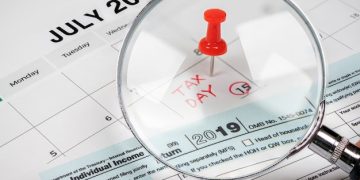Recent Updates: 2025 Legislation Boosts Income Opportunities in the US

Recent Updates: New Legislation in 2025 Opens Doors for Income-Boosting Opportunities in the US include various changes in labor laws, tax incentives for small businesses, and new funding programs designed to encourage entrepreneurship and innovation, potentially leading to increased income opportunities for many Americans.
The landscape of income generation in the United States is poised for significant change. Recent Updates: New Legislation in 2025 Opens Doors for Income-Boosting Opportunities in the US, promising new avenues for individuals and businesses to increase their financial well-being. Let’s explore the details.
Understanding the 2025 Legislative Changes
The new legislation enacted in 2025 represents a significant shift in the regulatory framework governing income generation. These changes are designed to stimulate economic growth and provide new opportunities for individuals and businesses alike. Understanding the core components of this legislation is crucial for capitalizing on the potential benefits.
Key Provisions of the New Laws
Several key provisions stand out within the 2025 legislation. These include changes to tax laws, incentives for small businesses, and new programs aimed at promoting innovation and entrepreneurship.
Impact on Different Sectors
The impact of these legislative changes will vary across different sectors of the economy. Some industries may experience rapid growth due to new incentives, while others may need to adapt to evolving regulations.
- Tax incentives for renewable energy projects, fostering green jobs.
- Reduced tax rates for small businesses investing in employee training.
- Grants and loans for startups focused on technological innovation.
In conclusion, the 2025 legislative changes present a transformative opportunity for the US economy. By understanding and adapting to these changes, individuals and businesses can position themselves to take advantage of new income-boosting opportunities.
New Tax Incentives for Small Businesses
One of the most significant aspects of the 2025 legislation is the introduction of new tax incentives specifically designed to support small businesses. These incentives aim to reduce the tax burden on small businesses, freeing up capital for investment and expansion.
Eligibility Criteria
To qualify for these tax incentives, small businesses must meet certain eligibility criteria. These criteria typically include factors such as annual revenue, number of employees, and industry classification.
Types of Tax Credits Available
The legislation offers a variety of tax credits, each targeting specific areas of business investment. These credits can be used to offset various expenses, such as investments in technology, employee training, and research and development.
- Tax credits for hiring new employees from disadvantaged communities.
- Credits for investing in energy-efficient equipment.
- Deductions for expenses related to employee childcare.
In summary, the new tax incentives for small businesses are a game-changer, providing much-needed financial relief and stimulating economic activity at the grassroots level.
Funding Programs for Entrepreneurs
Recognizing the vital role of entrepreneurship in driving economic growth, the 2025 legislation includes several new funding programs designed to support aspiring entrepreneurs. These programs provide financial resources and mentorship opportunities to help new businesses get off the ground.
Grant Opportunities
A range of grant opportunities are available to entrepreneurs with innovative business ideas. These grants can provide seed funding to cover initial startup costs, such as equipment, marketing, and product development.
Loan Programs
In addition to grants, the legislation also introduces new loan programs offering favorable terms to entrepreneurs. These loans can be used to finance business expansion, inventory purchases, and other capital expenditures.
- Microloan programs for minority-owned businesses in underserved areas.
- Low-interest loans for sustainable agriculture ventures.
- Venture capital funds focused on supporting women entrepreneurs.
In essence, these funding programs are designed to lower the barriers to entry for entrepreneurs, fostering a more vibrant and dynamic business ecosystem.

The Rise of the Gig Economy and Independent Contracting
The gig economy continues to grow, presenting flexible income-boosting opportunities for many Americans. The 2025 legislation addresses key aspects of this evolving landscape, including worker classification and benefits.
Worker Classification Rules
Clarified guidelines on worker classification help to ensure that independent contractors are properly classified and receive the protections they are entitled to.
Access to Benefits
New measures are in place to provide independent contractors with access to benefits such as healthcare and retirement savings plans, addressing a critical need in the gig economy.
- Portable benefits accounts that allow independent contractors to carry benefits across different jobs.
- Tax deductions for health insurance premiums paid by self-employed individuals.
- State-sponsored retirement plans for gig workers with matching contributions.
Ultimately, the 2025 legislation aims to create a fairer and more sustainable gig economy, balancing flexibility with worker protections.
Investing in Renewable Energy and Green Jobs
The push towards a sustainable economy is creating new income-boosting opportunities in the renewable energy sector. The 2025 legislation supports this trend through tax incentives, grants, and job training programs.
Tax Credits for Renewable Energy Projects
Businesses and individuals investing in renewable energy projects are eligible for tax credits, making green energy more accessible and affordable.
Job Training Programs
A variety of job training programs are available to equip workers with the skills needed to thrive in the green economy, from solar panel installation to wind turbine maintenance.
- Apprenticeships in renewable energy technologies.
- Grants for community colleges to develop green job training programs.
- Incentives for businesses to hire graduates of green job training programs.
In short, investing in renewable energy not only benefits the environment but also unlocks new income-boosting opportunities for individuals and businesses.
Financial Literacy and Investment Education
Empowering individuals with financial literacy and investment education is a key goal of the 2025 legislation. These initiatives aim to help people make informed financial decisions and build long-term wealth.
Government-Sponsored Programs
The government is sponsoring a range of financial literacy programs, offering free resources and workshops to help individuals understand personal finance basics.
Online Resources
A wealth of online resources are available, providing access to investment education materials and financial planning tools, making it easier for people to take control of their financial futures.
- Free online courses on budgeting, saving, and investing.
- Financial counseling services for low-income individuals and families.
- Mobile apps that gamify financial education and track spending habits.
In conclusion, by enhancing financial literacy and providing access to investment education, the 2025 legislation empowers individuals to make smarter financial choices and improve their long-term financial well-being.
Navigating the New Legal Framework
Understanding and complying with the new legal framework is essential for individuals and businesses seeking to capitalize on income-boosting opportunities. This requires staying informed about regulatory changes and seeking professional advice when needed.
Staying Informed
Regularly monitoring government websites, industry publications, and legal news sources is crucial for staying up-to-date on regulatory changes and compliance requirements.
Seeking Professional Advice
Consulting with legal and financial professionals can help individuals and businesses navigate the complexities of the new legal framework and ensure compliance.
- Legal clinics offering free or low-cost advice to small businesses.
- Financial advisors specializing in tax planning and investment strategies.
- Government agencies providing guidance on regulatory compliance.
Ultimately, by staying informed and seeking professional advice, individuals and businesses can successfully navigate the new legal framework and maximize their income-boosting opportunities.
| Key Area | Brief Description |
|---|---|
| 💰 Tax Incentives | New credits for small businesses and green energy investments are available. |
| 🚀 Entrepreneur Funding | Grants and low-interest loans support new businesses. |
| 💪 Gig Economy Benefits | Improved worker classification and access to portable benefits. |
| 🌱 Green Jobs | Incentives for renewable energy projects and training programs are expanding. |
Frequently Asked Questions
▼
The 2025 legislation includes new tax incentives for small businesses, funding programs for entrepreneurs, and measures to support the gig economy and green jobs.
▼
Small businesses can benefit from tax credits for investments in technology, employee training, and research and development, reducing their overall tax burden.
▼
Entrepreneurs can access grants, low-interest loans, and venture capital funds to support their business ventures, covering initial startup costs and expansion.
▼
The legislation clarifies worker classification rules and provides independent contractors with access to benefits, such as healthcare and retirement savings plans.
▼
Opportunities in the renewable energy sector include tax credits for projects and job training programs for roles like solar panel installation and wind turbine maintenance.
Conclusion
The Recent Updates: New Legislation in 2025 Opens Doors for Income-Boosting Opportunities in the US by offering a range of new initiatives and support mechanisms for individuals and businesses. By staying informed, seeking professional advice, and leveraging available resources, Americans can capitalize on these opportunities to enhance their financial well-being and contribute to a more prosperous economy.






